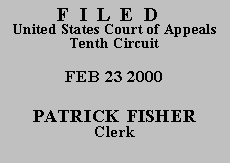

| GREGORY L. DANIEL,
v.
WYOMING DEPARTMENT OF
CORRECTIONS |
No. 99-8082
(D.C. No. 97-CV-183-D) (D. Wyo.) |
Because Daniel filed his § 2254 petition on July 23, 1997, more than one year after the effective date of the Antiterrorism and Effective Death Penalty Act ("AEDPA"), 28 U.S.C.A. §§ 2254-66 (1996), the AEDPA provision requiring a certificate of appealability applies to Daniel's appeal. Although the district court did not act on the issue of a certificate of appealability, the certificate of appealability is deemed denied by the district court pursuant to this court's General Order of October 1, 1996. See Tenth Circuit Emergency General Order issued October 1, 1996. On November 30, 1999, the district court denied Daniel's request to proceed in forma pauperis under 28 U.S.C. § 1915.
Daniel now applies to this court for a certificate of appealability and asks us to address his petition. He also appeals the order denying him in forma pauperis status.
A certificate of appealability may issue only if the applicant has made a substantial showing of the denial of a constitutional right. See 28 U.S.C. § 2253(c)(2). After reviewing Daniel's application for a certificate of appealability, his briefs to this court and the district court, and the record, we find no substantial showing of the denial of a constitutional right. Nothing in Daniel's brief or the record suggests that the limitations placed on Daniel's cross-examination of Dr. Bell, in reference to an unrelated sexual assault case, rose to the level of a constitutional violation. Similarly, nothing in Daniel's brief or the record suggests that the state court's evidentiary rulings with respect to the allegations concerning AH and KJ, who never testified at trial, rendered his trial so fundamentally unfair as to constitute a denial of his federal constitutional rights. See Duvall v. Reynolds, 139 F.3d 768, 789 (10th Cir. 1997). There is also nothing to show how the exclusion of the testimony of KeK and KaK infringed on Daniel's constitutional right to a fair trial or his right to confrontation. The allegation of prosecutorial misconduct lacks specificity, and therefore amounts to a conclusory argument that cannot suffice to demonstrate a violation of Daniel's constitutional right to a fair trial. Daniel's cumulative evidentiary error argument and his argument regarding the exclusion of certain expert testimony, like his argument concerning the court's evidentiary rulings with respect to AH and KJ, presents no legal or factual support to show that the alleged errors rendered his trial so fundamentally unfair as to constitute a denial of his federal constitutional rights. Finally, there is nothing in Daniel's brief or the record that shows us the content or context of the testimony regarding Daniel's failure to submit to a second interview, or that demonstrates that the testimony violated Daniel's Fifth Amendment rights.
Our review of the record demonstrates that the district court's analysis of the issues was correct, and that Daniel has failed has to make a substantial showing that he was denied a constitutional right. Accordingly, we DENY Daniel's application for a certificate of appealability and DISMISS this appeal. We also DENY his motion to proceed in forma pauperis.
The mandate shall issue forthwith.
ENTERED FOR THE COURT
David M. Ebel
Circuit Judge
*.After examining appellant's brief and the appellate record, this panel has determined unanimously that oral argument would not materially assist the determination of this appeal. See Fed. R. App. P. 34(a)(2) and 10th Cir. R. 34.1(G). The case is therefore ordered submitted without oral argument. This Order and Judgment is not binding precedent, except under the doctrines of law of the case, res judicata, and collateral estoppel. The court generally disfavors the citation of orders and judgments; nevertheless, an order and judgment may be cited under the terms and conditions of 10th Cir. R. 36.3.